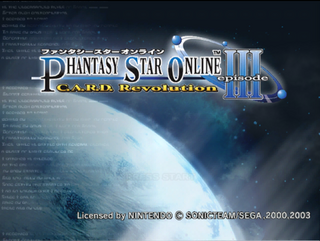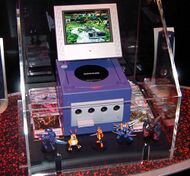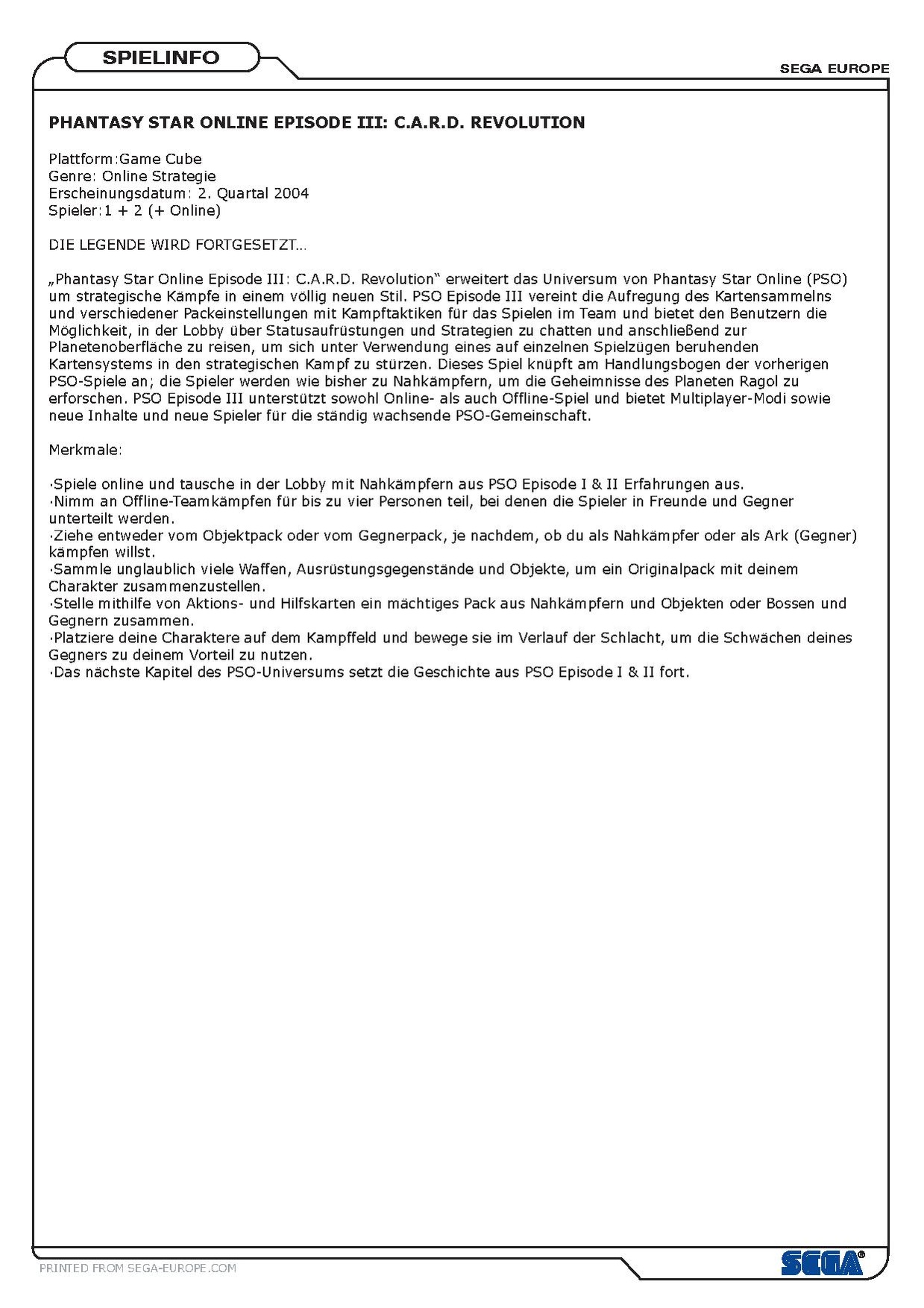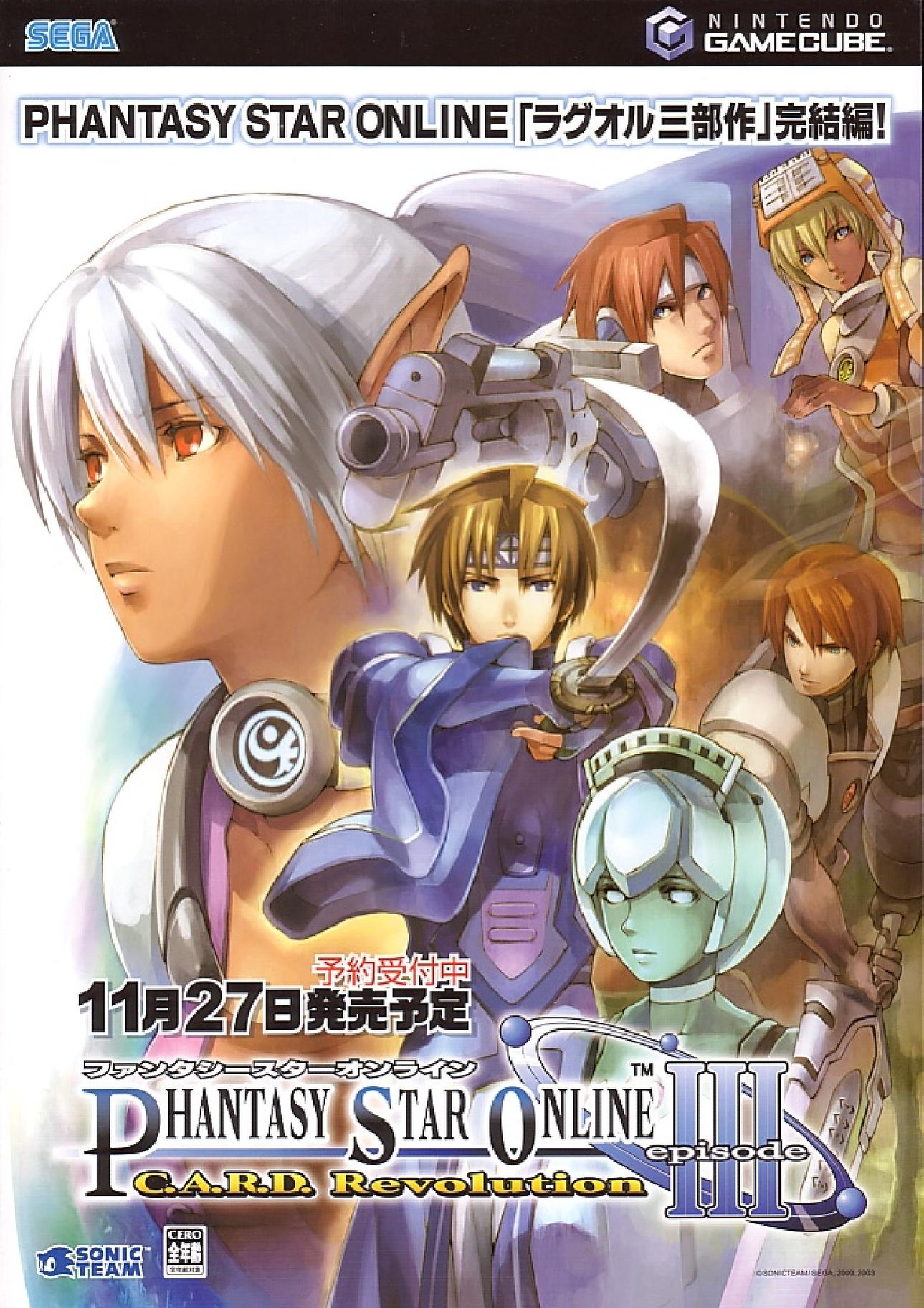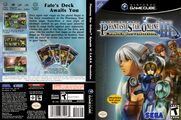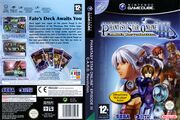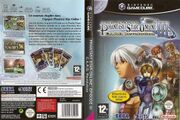Phantasy Star Online Episode III: C.A.R.D. Revolution
From Sega Retro
| Phantasy Star Online Episode III: C.A.R.D. Revolution | |||||||||||||||||||||||||||||||||||
|---|---|---|---|---|---|---|---|---|---|---|---|---|---|---|---|---|---|---|---|---|---|---|---|---|---|---|---|---|---|---|---|---|---|---|---|
| System(s): GameCube | |||||||||||||||||||||||||||||||||||
| Publisher: Sega | |||||||||||||||||||||||||||||||||||
| Developer: Sonic Team | |||||||||||||||||||||||||||||||||||
| Supporting companies: Wave Master (audio) | |||||||||||||||||||||||||||||||||||
| Peripherals supported: Game Boy Advance Cable, Broadband Adapter, Modem Adapter, Keyboard | |||||||||||||||||||||||||||||||||||
| Genre: Strategy RPG | |||||||||||||||||||||||||||||||||||
| Number of players: 1-4 | |||||||||||||||||||||||||||||||||||
|
This short article is in need of work. You can help Sega Retro by adding to it.
Phantasy Star Online Episode III: C.A.R.D. Revolution (ファンタシースターオンライン エピソード3 カードレボリューション) is the third episode in the Phantasy Star Online series. Unlike previous expansions Phantasy Star Online Episode III: C.A.R.D. Revolution is not an updated release of Phantasy Star Online but a standalone game with cross functionality with Phantasy Star Online Episode I & II released exclusively on the Nintendo GameCube. The game was also a large departure from the gameplay style seen in the Phantasy Star Online series as the game takes the form of a turn based strategy game with trading card game elements.
Contents
Story
In 3090, twenty-one years after Episode I and II, Principal Tyrell was supplanted by Dol Grisen because Tyrell had been unable to explain the destruction of Pioneer 1. Under Grisen's dictatorial rule, Pioneer 2 declared its independence from Coral. Grisen, in his lust for more power, allocated the majority of the ship's resources to the military -- primarily towards the development of cloning Technology.
As Pioneer 2's scientists researched cloning in accordance with Grisen's mandate, they discovered an energy source that rivaled Photon in power. This technology, dubbed C.A.R.D. Technology, is able to seal the world's phenomena into cards. These cards can hold anything from animals and weapons to skills and techniques, which can be instantly materialized at the whim of the user. To increase the development of C.A.R.D. Technology, Pioneer 2 began the colonization of Ragol.
A group of Hunters on Pioneer 2 are allowed to use this experimental C.A.R.D. Technology to help carry out the requests of scientists, who are directly under Grisen's command. Most requests are to counter the acts of a rebel group known as Arkz. The Arkz have learned how to replicate C.A.R.D. Tech and have managed to apply it to the creatures of Ragol. With their new found power, the Arkz fight to expose the government's corruption, and keep them from overdeveloping the planet for their own gain.
Gameplay
History
Development
The concept for what would be known as Phantasy Star Online Episode III: C.A.R.D. Revolution came about from Nintendo's idea for a portable screen peripheral which can be used in conjunction with the Nintendo Gamecube's LAN multiplayer capabilities for portable Multiplayer gameplay. Phantasy Star Online Episode III: C.A.R.D. Revolution (Then known as PSO Card Battle) was initially developed to take advantage of the proposed Gamecube link up and portable features.[4]
At E3 2002, Nintendo announced SEGA's new project, PSO Card Battle and presented a prototype playable on the aforementioned portable LCD screen. At an Iwata Asks it was revealed that these screens were intended to be capable of auto stereoscopic display though the only confirmed game to have been intended to use this feature was Luigi's Mansion[5], whether Phantasy Star Online Episode III: C.A.R.D. Revolution would have supported stereoscopic 3D display is not known. The portable LCD screen would unfortunately never see release and the final game would launch without any LAN party support, thus local Multiplayer functions much like Phantasy Star Online Episode & II sans any form of split screen. Alongside the game prototype there was also physical game cards and five prototype figurines based on characters and enemies from the Phantasy Star Online universe which were unfortunately stolen during the event[6].
Despite the game originally being intended for the Gamecube, the final game contains unused graphics for a PSO Card Battle prototype that has references to PC functions (e.g "Press Enter Key").[7] Furthermore the game would at some point be rumored to have an Xbox version in the works.[8]
Release
The game would be unveiled as Phantasy Star Online Episode III: C.A.R.D. Revolution on E3 2003, revealed as the continuation of the story arc from the previous Phantasy Star Online games.[9] Prior to the game's launch, SEGA held an open trial in Japan wherein the first 10,000 users to sign up would be chosen to participate from July 24th to September 16th. The game would launch in Japan on November 27th, 2003 with a US and European release following up the next year on March 2nd and June 11th.
Much like previous Phantasy Star Online releases, the game required a unique Serial Code and Access Key to play, but the player could alternatively use their Phantasy Star Online Episode I & II to keep their Guild Data (though no character transfer support). Furthermore, aside from the five unique CARD lobbies, Episode III players can interact with Episode I & II players in their respective lobbies and chat together. The game also contained a hidden preview for Billy Hatcher and also allowed the player to receive free bonus cards by saving their game data on a memory card containing save data from other Sonic Team games.
Also Released On
Production credits
- Producer: Yuji Naka
- Director: Yojiro Ogawa
- Lead Game Designer: Kenichi Fujiwara
- Lead Art Designer: Ayumu Nishino
- Lead Programmer: Koichi Toya
- Lead Game Designer: Kenichi Fujiwara
- Game Design Staff: Yojiro Ogawa, Kenichi Fujiwara, Hidenobu Hasebe, Takako Nagase, Yosuke Tanaka
- Art Design Staff: Ayumu Nishino, Haruka Haginoya, Kenji Odaka, Syoko Ninomiya, Satoshi Kunitomo, Takashi Ishihara
- Programming Staff: Koichi Toya, Koji Ogino, Toshihisa Satake, Ryuichi Ishiguro, Hirofumi Fujimoto
- Network Staff: Akio Setsumasa, Kazuhiro Tonogi
- Web Design Staff: Miho Bonkohara, Yuji Hirukawa, Masanori Shirouzu
- Project Test Staff: Kazuyuki Kawamura, Hirokazu Toyoshima, Harumasa Nakajima, Hiroshi Hasegawa
- Special Thanks to: Shintaro Hata, Atsushi Kanno, Hideaki Moriya, Satoshi Sakai, Ai Ikeda, Kosei Kitamura, Yuki Takahashi, Takanori Fukuzawa, Daizo Kimura, Kyoko Chino, Shinya Matsunami, Nobuo Nakagawa, Yasuko Maruyama
- Sound Producer: Tatsuya Kozaki
- Sound Director: Kenichi Tokoi
- Sound Creator & Designer: Kenichi Tokoi, Fumie Kumatani, Hideaki Kobayashi, Masaru Setsumaru
- Sound Created By: Wave Master Inc.
- Recording Engineer: Hirokazu Akashi, Miya Yoshitada
- Recording Studio: Wave Master Recording Studio
- Orchestra Arranger & Conductor: Masamichi Amano
- Orchestra Recording Producer: Kotaro Kawada (Band Power)
- Orchestra Recording Director: Fumitaka Shibata
- Orchestra Recording Coordinator: Hidetaka Carl Shibata (Band Power)
- Recording Engineer: Andrzej Sasin
- Main Orchestra Play: Warsaw Philharmonic Orchestra
- Boy Soprano: Krzysztof Przygudzki
- Recorded at: Warsaw Philharmoni Hall
- Executive Management: Hideki Okamura, Masanao Maeda, Hidekazu Yukawa, Toshihiro Nagoshi, Yukio Sugino
- Sales: Akira Nomoto, Katsushi Yasuda, Toru Yasuda, Tomoaki Ishidao, Yusuke Watanabe, Koji Uemura, Haruo Imatsu, Nobuhiro Tanaka, Kenichi Hashimoto, Yoshihito Endo, Katsutoshi Memezawa, Teruyuki Awaji, Yasunobu Masahiro, Toshiyuki Tanaka, Hiroshi Iizuka
- Publicity: Yasushi Nagumo, Youko Nagasawa
- Marketing Promotion: Mitsuru Takahashi, Naoko Ooka
- Product Management: Takeshi Shimizu
- Design Production Team: Yoshihiro Sakuta, Yoichi Takahashi, Chieko Nakamura
- International Business & Product Development: Tatsuyuki Miyazaki, Yusuke Suai
- Special Thanks to: Akihiro Etori, Akinobu Koechi, Akira Nishikawa, Akira Terasawa, Don Baker, Eisuke Hayashi, Hideki Yohkaichiya, Jin Kojima, Junichi Shimizu, Junichiro Takahashi, Kazuhiko Morii, Kazunori Yagi, Mutsuhiro Fujii, Sunao Murayama, Takaaki Jindo, Teruo Yabumoto, Tomoki Kaji, Tomoki Matsuura, Toshimasa Kubo, Yasushi Yamashita, Yuji Nakamura, Yutaka Shoji
Product Development
- Localization Manager: Osamu Shibamiya
- Localization Producer Jason Kuo
- Quality Assurance Lead Tester Demetrius Griffin
- Text Rewriter Tom Fong
- Special Thanks to: SOA Marketing
- President and Coo: Naoya Tsurumi
- Executive Vice President, Product Development: Jin Shimazaki
- Executive Vice President, Sales and Marketing: Mike Sherlock
- Product Development: Matt O'Driscoll, Elliott Martin
- Marketing: Gary Knight, Mark Fisher
- Technology: Ryusuke Ito, Morgan Evans, Jason Cunningham, Stephen Tan, Sean Quinlan
- Quality Assurance Team: Darius Sadeghian, David Smith, Chris Geiles, Roy Boateng
- Illustrators: Akifumi Yamamoto, Akira Ishida, Akitoshi Yahiro, Atsushi Kawasaki, Daisuke Kazami, Eiji Kaneda, Hideaki Takamura, Hirofumi Karino, Ittoku, Jin Shirakami, Kaduki Sendoh, Kazuhiro Shinozaki, Kazuki Kugawara, Kazumi Tanabe, Kazuno Yuikawa, Koul, Masaki Hirooka, Miho Midorikawa, Mikumo, Munetaka Ikeda, Norikatsu Miyoshi, okome, Raita Kazama, RYOU KUDOU, Shinya Kaneko, Taro Yamazaki, TOHRU, Taro Takefushi, UGETSU HAKUA, UL, YanagiSuji, Yoshio Sugiura, 119, Akikazu Mizuno
- Executive Producer: Hisao Oguchi
- Created by: Sonic Team
- Presented by: Sega
Magazine articles
Promotional material
Wallpapers
Merchandise
Artwork
Physical scans
| Sega Retro Average | ||||||||||||||||||||||||||||||||||||||||||||
|---|---|---|---|---|---|---|---|---|---|---|---|---|---|---|---|---|---|---|---|---|---|---|---|---|---|---|---|---|---|---|---|---|---|---|---|---|---|---|---|---|---|---|---|---|
|
| 77 | |
|---|---|
| Based on 8 reviews | |
External links
- Sega of Japan catalogue pages (Japanese): GameCube (archive)
- Official website (Japanese) (archive)
- Official website (English) (archive)
- Nintendo catalogue pages: JP, US (archive)
References
- ↑ http://sega.com/games/game_temp.php?game=pso3card (Wayback Machine: 2005-04-03 12:49)
- ↑ Press release: 2004-03-02: SEGA OF AMERICA RELEASES PHANTASY STAR ONLINE EPISODE III: C.A.R.D. REVOLUTION
- ↑ 3.0 3.1 http://sega.jp/gc/pso3/ (Wayback Machine: 2004-08-21 12:28)
- ↑ https://www.gamespot.com/articles/e3-2002-nintendo-announces-phantasy-star-card-battle-game/1100-2867375/ (Wayback Machine: 2019-05-13 20:54)
- ↑ http://iwataasks.nintendo.com/interviews/#/3ds/how-nintendo-3ds-made/1/1
- ↑ http://sonicteam.com:80/pso/english/new.html (Wayback Machine: 2003-06-05 08:04)
- ↑ The Cutting Room Floor: Phantasy Star Online Episode III: C.A.R.D. Revolution
- ↑ http://www.xboxworld.nl/index.php?show=news&id=4140 (Wayback Machine: 2004-03-08 21:06)
- ↑ http://www.pso-world.com/content.php?897-phantasy-star-online-episode-iii-card-revolution-announced (Wayback Machine: 2019-05-13 21:04)
- ↑ Electronic Gaming Monthly, "April 2004" (US; 2004-03-02), page 129
- ↑ GamePro, "April 2004" (US; 2004-03-02), page 101
- ↑ GMR, "April 2004" (US; 2004-xx-xx), page 85
- ↑ NGC Magazine, "February 2004" (UK; 2004-01-16), page 64
- ↑ NGC Magazine, "June 2004" (UK; 2004-05-20), page 54
- ↑ Nintendo Power, "April 2004" (US; 2004-0x-xx), page 120
- ↑ Play, "March 2004" (US; 2004-xx-xx), page 60
- ↑ Surge, "Spring 2004" (US; 2004-04-13), page 123
- Game Boy Advance Cable-compatible games
- Broadband Adapter (GameCube)-compatible games
- Modem Adapter (GameCube)-compatible games
- 1-4 player games
- JP GameCube games
- All JP games
- US GameCube games
- All US games
- DE GameCube games
- All DE games
- FR GameCube games
- All FR games
- UK GameCube games
- All UK games
- AU GameCube games
- All AU games
- All simulation games
- GameCube games
- All 2003 games
- 2003 GameCube games
- GameCube games with ADX audio
- GameCube games with Dolby Pro Logic II support
- GameCube games with Sofdec video
- Use romtable template
- All games
- Stubs
- Credits without reference
- Phantasy Star Online Episode III: C.A.R.D. Revolution
- Phantasy Star (franchise)
- MMORPGs
